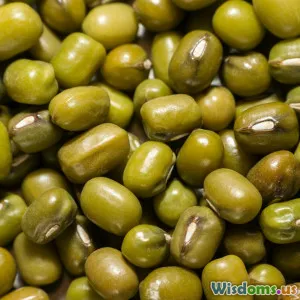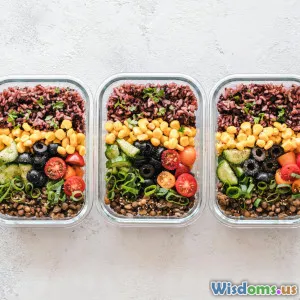
Plant Based Protein Sources That Rival Meat for Muscle Growth
8 min read Discover powerful plant-based protein sources that effectively support muscle growth, rivaling meat in nutrition and benefits. (0 Reviews)
Plant-Based Protein Sources That Rival Meat for Muscle Growth
Muscle growth and repair hinge critically on an adequate protein intake. For years, animal-based proteins like beef, chicken, and fish have been lauded as the go-to for muscle builders. But what if plant-based proteins could deliver the same muscle-building power while offering additional health and environmental benefits?
Surprisingly, an array of plant-sourced proteins do just that — rival meat in quality, digestibility, and essential amino acid profiles necessary for hypertrophy. Whether you’re vegan, vegetarian, or simply exploring alternatives, this guide sheds light on top plant-based proteins scientifically proven to promote muscle growth as effectively as meat.
Understanding Protein and Muscle Growth
Muscle synthesis isn’t just about total protein intake; it’s about the quality and amino acid composition. Essential amino acids (EAAs), particularly leucine, play a pivotal role in signaling muscle protein synthesis (MPS).
Animal proteins are often deemed “complete,” containing all nine EAAs in sufficient amounts. Many plant proteins tend to be “incomplete,” missing or low in some EAAs. However, blending different plant sources or choosing certain “complete” plants can overcome this easily.
According to a 2018 study published in the Journal of the International Society of Sports Nutrition, many plant proteins, when consumed in adequate quantity and variety, can trigger MPS comparably to animal proteins.
Top Plant-Based Proteins for Muscle Growth
1. Lentils
Lentils are a protein powerhouse. One cup cooked has about 18 grams of protein, packed with fiber and iron.
- Amino Acid Profile: While low in methionine, combining lentils with grains like rice fills amino acid gaps.
- Muscle-Building Benefits: Lentils boast a moderate leucine content important for MPS stimulation.
Example: Fitness trainer and nutrition researcher Dr. Layne Norton includes lentils in his plant-based meal plans due to their balance of protein and carbohydrates fueling workouts.
2. Quinoa
An exceptional plant protein because it’s a complete protein source.
- Protein Content: About 8 grams per cooked cup.
- Amino Acid Profile: Contains all nine essential amino acids, high in lysine which is typically low in plants.
Environmental Benefits: Quinoa’s sustainability makes it a smart choice beyond fitness.
A study from Nutrition & Metabolism (2019) demonstrated that diets including quinoa support lean mass during resistance training.
3. Chickpeas
Chickpeas pack about 15 grams of protein per cooked cup.
- Versatility: Used in hummus, curries, salads, adding diversity to a plant-based diet.
- EAA Content: Tryptophan and methionine levels can be limited but are complemented by whole grains.
Athlete testimonials note improved recovery and sustained muscle gains with chickpea-rich meals.
4. Hemp Seeds
Hemp seeds contain 10 grams of protein per 3 tablespoons with a rich omega-3 profile.
- Complete Protein: All EAAs present, high in arginine, linked to improved blood flow and muscle pump.
- Digestibility: Highly bioavailable protein advantageous for muscle repair.
A 2020 review in the European Journal of Clinical Nutrition highlighted hemp’s superior digestibility among plant proteins.
5. Pea Protein
A favorite in vegan protein powders due to high leucine content (about 7-8%).
- Protein Concentration: Often over 20 grams per serving.
- Research Insight: Pea protein stimulates MPS effectively almost on par with whey—the standard muscle-building supplement.
Prominent bodybuilder Nimai Delgado endorses pea protein for clean gains without animal products.
6. Tempeh and Tofu
Derived from soybeans, both tempeh and tofu offer 15-20 grams protein per 100 grams.
- Soy Protein: A complete protein source rich in all EAAs, especially leucine.
- Fermentation Benefits: Tempeh’s fermentation enhances digestibility and nutrient absorption.
The American Journal of Clinical Nutrition reveals soy protein promotes muscle protein synthesis similarly to animal protein in healthy adults.
Combining Plant Proteins for Maximum Impact
Achieving a complete amino acid profile is straightforward with mindful combinations:
- Rice and beans
- Lentils with whole grain bread
- Hummus on whole wheat pita
These combos ensure you don’t miss essential amino acids for muscle recovery and growth.
Nutritionist and author Alan Aragon stresses, "It’s about total daily protein and variety — plant proteins can meet or exceed animal protein quality."
Beyond Muscle Growth: Health and Environmental Advantages
Switching to plant-based options offers benefits beyond muscle building:
- Heart Health: Lower saturated fat and cholesterol.
- Gut Health: High fiber content supports digestion.
- Sustainable Protein: Plant sources reduce carbon footprint drastically. Research by the Eat-Lancet Commission confirms plant-forward diets are key to feeding the world sustainably.
Practical Tips to Incorporate Plant Proteins
- Start with easy swaps: Try black bean burgers instead of beef.
- Use plant protein powders in smoothies.
- Experiment with recipes featuring lentils, quinoa, and chickpeas.
- Plan complete meal combos.
Athletes report increased energy and muscle gains after transitioning gradually.
Conclusion
Contrary to popular belief, you don’t need animal products to build impressive muscle mass. Lentils, quinoa, chickpeas, hemp seeds, pea protein, and soy products provide robust, complete protein sources capable of promoting muscle hypertrophy.
Science-backed evidence and real-world experiences affirm that plant-based proteins can rival meat in muscle-building potency, while also delivering unique health and eco benefits.
So whether you are a dedicated vegan, vegetarian, or simply exploring sustainable nutrition, integrating these plant proteins will fuel your muscle growth journey effectively and ethically.
References
- Jäger, R., et al. (2017). International Society of Sports Nutrition Position Stand: Protein and exercise. Journal of the International Society of Sports Nutrition.
- Joy, J. M., et al. (2013). The effects of pea protein and whey protein supplementation on muscle thickness and strength. Nutrition & Metabolism.
- Li, C., & Wang, L. (2020). Bioavailability and digestibility of hemp seed protein. European Journal of Clinical Nutrition.
- Messina, M. (2014). Soy Protein, Soy Isoflavones, and Muscle. The American Journal of Clinical Nutrition.
- Eat-Lancet Commission. (2019). Food in the Anthropocene: The EAT-Lancet Commission on healthy diets from sustainable food systems.
Empower your muscle growth and health choices by embracing the vibrant realm of plant-based proteins today!
Rate the Post
User Reviews
Popular Posts




















